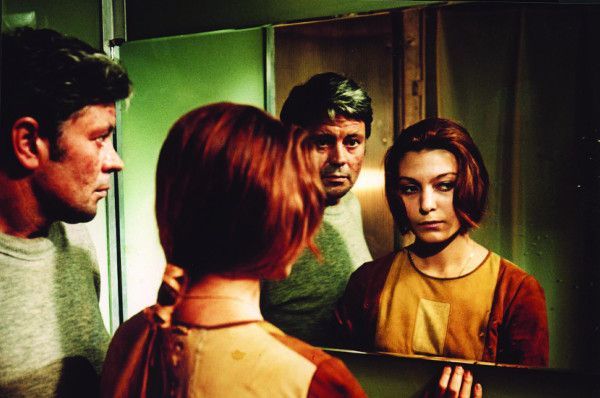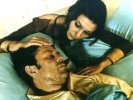Eye For Film >> Movies >> Solaris (1972) Film Review

Russian language credits start rolling over the screen accompanied by haunting organ music, Bach's "Ich ruf zu dir, Herr Jesu Christ", setting a strangely lethargic and alien tone for the rest of the movie. First scene: pond weeds billow in flowing water, eventually the camera picks out a slightly dishevelled looking human looking sadly into camera, his face registering a million heartaches. This is our hero Kris Kelvin. Solaris instantly attains a massive dignity which it retains thoughout.
A group has gathered at Kris' father's idyllic country house to watch old movies. The movies are space agency documentary footage of the testimony of a pilot named Burton. He tells of flying over the liquid surface of the planet named Solaris. He tells of strange visions of strangely familiar formations that appeared before his eyes on the planet's surface, film footage taken from his aircraft is shown that backs up his story 0 per cent. The assembled scientists offer the hypothesis that Solaris' sentient ocean somehow influenced Burton's mind, others begin to question Burton's mental state. A considerably aged Burton is watching the film amongst the guests.

It soon becomes apparent that the scientific community has tired of Solaris failing to yield its secrets. Gradually staff and resources are pulled away from the research leaving a space station in orbit with three occupants, astrobiologist Sartorius, cyberneticist Snaut and physiologist Guibariane. Over time, contact has been lost with these men.
Kris is a psychologist and is being sent to the Solaris space station to determine what has become of them.
Upon arrival at the station, to no welcome at all, Kris discovers Guibariane is dead and the remaining two are men behaving strangely. It soon becomes apparent to Kris that the three are not alone on the space station after all.
Solaris is a treatise on what happens when you find out you are in fact the laboratory rat when you thought you were a scientist.
Solaris' power has been diluted over the years, its (minimal) effects have been rendered obsolete, while several other shows have borrowed the theme, for example Event Horizon is a horror film revision of Solaris.
An unsatisfying remake with George Clooney and Natascha McElhone in the lead roles directed by Steven Soderbergh appeared, but Tarkovsky had set too lofty a target, the magnificent dignity of this film, its moments of eerie beauty, a Brueghel painting almost coming to life, a brief ballet of weightlessness, the little mistakes that Solaris makes in its recreations, the horror of a frozen corpse regaining life...
The source novel by Stanislaw Lem ends with Kris musing his lot in life and "cruel miracles" on the planet surface at the conclusion of the mission. Tarkovsky goes way beyond this reaching a conclusion only hinted at in the book. Whereas the not dissimilar 2001: A Space Odyssey ends with an enigma, the ending to Solaris seems a perfect solution. It's an ending that has haunted me for 30 years and I still get goosebumps when seeing it today.
This film is a chore to sit through. It requires careful attention. If you are attuned to it it is rewarding beyond almost any other film I can think of.
Reviewed on: 23 Mar 2009
















